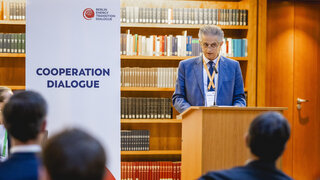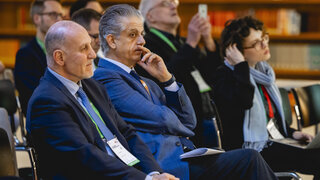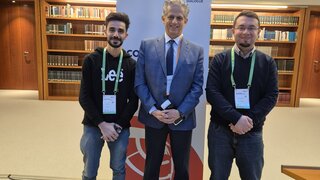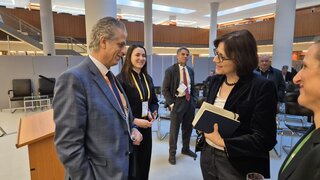Participation of the Jordanian ambassador to Germany in the Berlin Energy Transition Dialogue

The Berlin Energy Transition Dialogue (BETD), established in 2015, is a leading global forum for discussing the energy transition, bringing together government officials, business leaders, scientists, and NGOs. The event focuses on achieving a 100% renewable energy supply, highlighting its role in combating climate change and fostering economic growth through job creation and decentralized energy systems. Organized by the German government and key renewable energy organizations, BETD is the largest and longest-running energy transition conference hosted at the Federal Foreign Office.
The "Cooperation Dialogue: Power Grids for Renewable Energy Expansion" session addressed the challenges and opportunities in integrating renewable energy (RE) into modern power grids. Experts from various sectors discussed the need for a more flexible, resilient, and adaptive grid to ensure the security of supply while meeting climate targets. As electricity generation and consumption become increasingly decentralized, grid operators face new demands in terms of stability, efficiency, and security.
The cooperation dialogue was opened by H.E. Dr. Fayiz Khouri, Ambassador, Embassy of the Hashemite Kingdom of Jordan to Germany, with a remarkable speech where he highlighted, that Jordan has made significant strides in renewable energy, but challenges remain. H.E. Dr Fayiz Khouri highlighted that both, Jordan and Germany, must strengthen grid expansion and optimization to support renewable growth. The German-Jordanian Energy Partnership plays a key role in sharing expertise, addressing grid challenges, and ensuring a sustainable energy future for both countries.
Preview of the partnerships´ image film focusing on the Power Grid
The ambassador's speech was introduced by the preview of an image film of the energy partnership between Germany and Jordan. Using the example of the “Power Grids” working group, the work of the energy partnership is presented in concrete terms: Both countries are working together to improve grid stability with the aim of achieving a climate-neutral economy. The partnership focuses on overcoming challenges related to fluctuating power generation, grid adaptation and knowledge sharing to promote the energy transition. Key participants, including experts from both countries, emphasized the importance of international cooperation for a sustainable and secure future.


